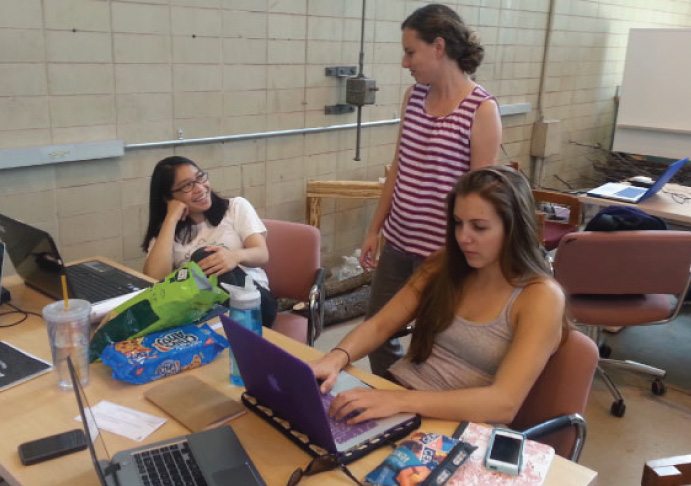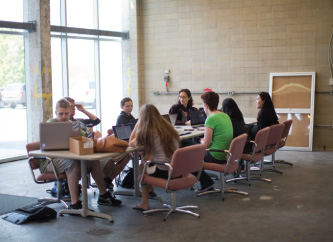Mountaintop Mentor - Kelly Austin

Austin, along with Associate Professor Breena Holland, is mentoring a group of six students working on the project called “Innovation in ventilation: A combined research experience on indoor air pollution.” Soon after the students got to work in late May, Austin spoke to us about her thoughts on the Mountaintop project and her hopes for her group this summer.
What, in your mind, is the value of the Mountaintop experience? What can it offer to students?
The Mountaintop program is really amazing, as it has allowed me to develop truly interdisciplinary research ideas and teams of students. Our team of students is comprised of three social scientists and three engineers. These students would never have come together (or seen the value of coming together) without the support from Mountaintop. Our project involves designing innovations in ventilation to reduce indoor air pollution in small kitchens in Sub-Saharan African nations, as well as producing scholarly research that examines the larger socio-economic causes of solid fuel use and the health risks associated with indoor air pollution.
It is amazing to see the entire team working together and learning with one another. They are learning that the best-designed intervention is useless if it is not culturally appropriate, or if it doesn’t take into account social inequalities in household decision-making where the intervention is targeted. Thus, engineers and social scientists really do need to come together to make projects like this successful. Daily, I get to witness “ah-ha” moments like when a sociology student learns about the relevance of wind currents for our project or when an engineering student learns about the role of gender inequality in vulnerabilities to indoor air pollution.
How did you get involved with this project and these students?
I got interested in this project after conducting my own fieldwork in rural Uganda related to HIV and malaria. I had heard of the problems with indoor air pollution before, but was very shocked to see women cooking in tiny huts for hours with no windows. As I started to delve into the issue further with one of my students, Theresa, who is currently on my Mountaintop project, we came to learn that key interventions around indoor air pollution involve implementing new stoves or fuel sources. However, this is really not a feasible intervention for very poor households who cannot afford to buy fuels or for which the stove design is not culturally appropriate. We instead thought that focusing on interventions to simply improve ventilation may be more appropriate to implement, and more likely to be adopted by the household, as it does not require purchasing a new fuel source, etc.
I have had the pleasure of working with four of the students on the project before, including all three social scientists and one of the engineers. Amber, one of the team’s engineers who was on another interdisciplinary team I facilitated, helped me to identify two more engineers who would be great to work on this project. So really, the team naturally came together given the students’ interests and different expertise on the issue, and was student-driven in its formation as well.
What value does the space and/or unique approach to learning offered at Mountaintop do for this project in particular?
I spoke to the value of an interdisciplinary approach in my response to question one, so I will focus on the space aspect here. The space at Mountaintop is truly necessary for our project. This week, the students will begin building a mock kitchen using sticks and clay–just as is it is done in Uganda. They have already begun harvesting poles and smaller sticks and storing them at our work space at Mountaintop. It would have been impossible to do a project like this without the raw and large space that Mountaintop provides. Without having the space to really be able to get their hands dirty (and the space dirty, too), we would not have been able to carry out such a project.
What hopes do you have for your team’s outcome?
Each of the social science students have the goal of producing a scholarly research article, and the team of engineers also plans to write a publishable paper framed as a service learning piece which details the results of our experiments comparing the success of the different ventilation interventions being tested. We also hope to apply for funding in the fall to support actually implementing the best identified intervention(s) at kitchens in Uganda. This would really bring the project full-circle, and could potentially have a global impact that improves quality of life for people in poor nations.
Posted on:





